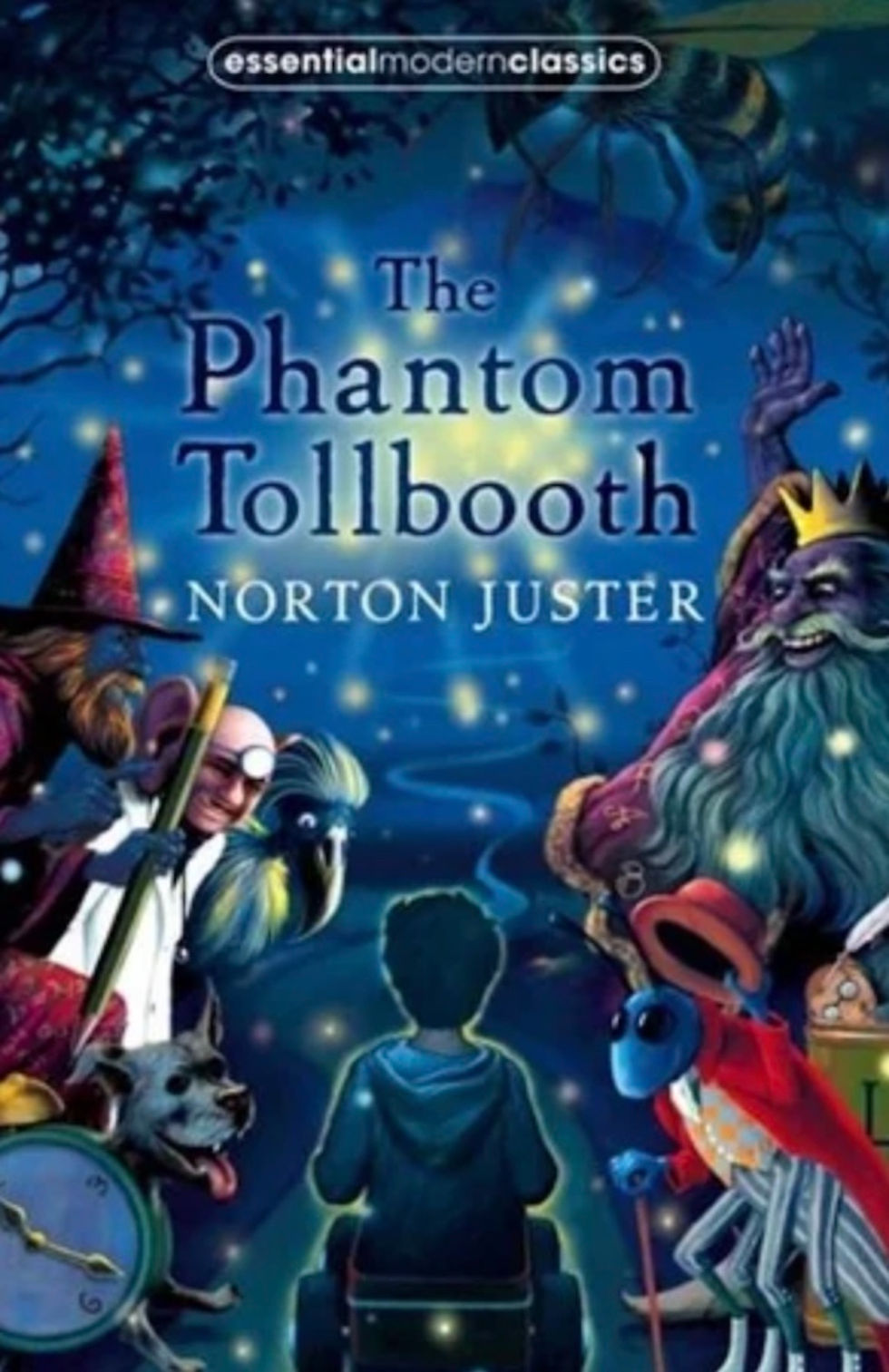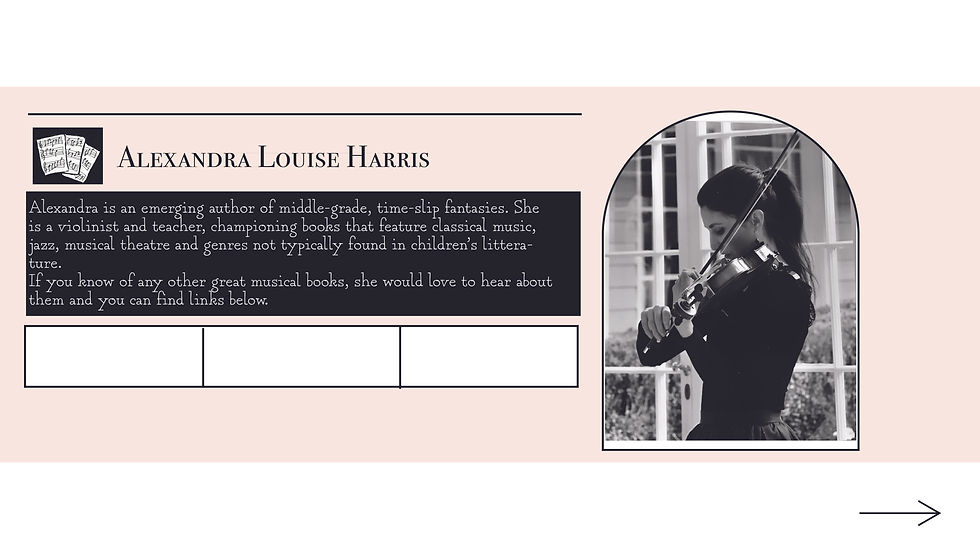The Phantom Tollbooth
- Alexandra Louise Harris

- Oct 24, 2023
- 4 min read
Updated: Mar 3, 2024
Okay, I’ve just unearthed Ferdinand’s all-time favourite musical book. I’m calling it now, as I don’t believe it will ever be beaten… although, we often get quite excited by these things, so there is the possibility we will change our mind next week.

At present, however, we are enamoured by The Phantom Tollbooth. Not only does this book feature a composition titled The 'Colorful Symphony', an MGM musical film and a musical—the prose itself sounds musical! There’s a lot of music, melodies, tones, sounds, jingles, themes, chords, notes… and if you haven’t already guessed; words.
In fact, the words and numbers are some of the funnest parts. I know, funnest isn’t really a word, but it should be.
Anyway, the story begins with our protagonist, Milo, feeling terribly bored. He has no interest in anything. Everything seems a waste of time and worst of all; there's nothing for him to do. Fortunately, he comes across a package. ‘Attached to one side was a bright-blue envelope which said simply: FOR MILO, WHO HAS PLENTY OF TIME.’
When Milo, our reluctant but intrepid traveller, steps foot inside the tollbooth a world of adventure awaits.
By the way, there’s a few spoilers here, so if you prefer to experience the book with fresh eyes and ears, I shall see you anon.
You're here? Yay! I hope you won't be disappointed. We certainly weren't. You see, Milo arrives in the Kingdom of Wisdom where princesses Rhyme and Reason have gone missing! With the help of a Humbug and a watchdog named Toc (his brother was Tic), he sets out to rescue them from the Castle in the Air. The Valley of Sound is now completely silent. And in order to restore things, Milo confronts the Soundkeeper in his fortress whilst listening to his favourite radio program—15 Minutes of Silence.
I’m sure John Cage would highly approve.
The Soundkeeper, however, loves sounds. Bells and jingles, but when everyone began making so much noise, all competing with one another, he decided no noise was better than a cacophony.
‘People laughed less and grumbled more, sang less and shouted more, and the sounds they made grew louder and uglier. It became difficult to hear even the birds or the breeze, and pretty soon people stopped listening to them.’
As we know, listening can be a challenge for many. As one ten-year-old student kindly informed me last week, she only listens to things that are important. I couldn’t help pondering how she knows what’s important without listening? We both agreed it was a perplexing puzzle and many such quagmires abound in this novel.
‘As long as the answer is right,’ says a Dodecahedron, ‘who cares if the question is wrong. If you want sense, you have to make it yourself.’ When questioned if numbers are important, he becomes quite indignant. ‘Could you have tea for two without the two—or three blind mice without the three? Would there be four corners of the earth without the four? And how would you sail the seven seas without the seven?’
Milo meets half a child from an average family; ‘a mother, father and 2.58 children… with 1.3 automobiles.’ He meets Dr Discord—and with the aid of his faithful servant Dynne—he sets out to collect all the awful dins. Horrible noises and anything that sounds like utter pandemonium. However, in order to rescue the princesses, Milo and his friends must run a gauntlet of demons. Horrible Hindsight, Overbearing Know-it-all, and Gross Exaggeration, to name a few.
As you can see, it’s a lot of fun and it made me wonder if Norton Juster was a teacher. And it seems after his time in the American navy, he was! He taught part-time whilst working at an architectural firm, and later became a professor of architecture at Hampshire College.
I can’t help wondering if he ever taught in a primary school. If you know the answer, please let me know!
When reading about his life, however, I was struck by something else. Like our friend Alexander Scriabin and many other composers, Juster had synaesthesia. Violetta’s best friend Anna also has that ability and A Colourful Symphony is conducted by a man named Chroma the Great; ‘conductor of colour, maestro of pigment and director of the entire spectrum.’ The orchestra plays all day long, painting everything from sunrise to sunset, and all night too. If they stop, the colour vanishes completely.

I must add, I’m a big fan of Chroma’s hairstyle and eyebrows, and whilst in the book he doesn’t use a baton, his cartoon persona wields it with distinction.
So… having discovered this book in a second-hand store—and devoured it in one sitting—it also feels serendipitous. I had vague recollections of the title, but I didn’t realise it was so musical! It was good timing too. I’m just about to dive into the final edits for Violetta 2, and I needed a burst of creative inspiration.
Although I fear Horrible Hindsight will be there, hopefully Princesses Rhyme and Reason can sort it all out. If not, I may be found roaming the streets in search of abandoned tollbooths until further notice.
#phantomtollbooth, #middlegradebooks, #violettabooks, #timetravelfiction, #colourfulsymphony, #chromathegreat,





Comments